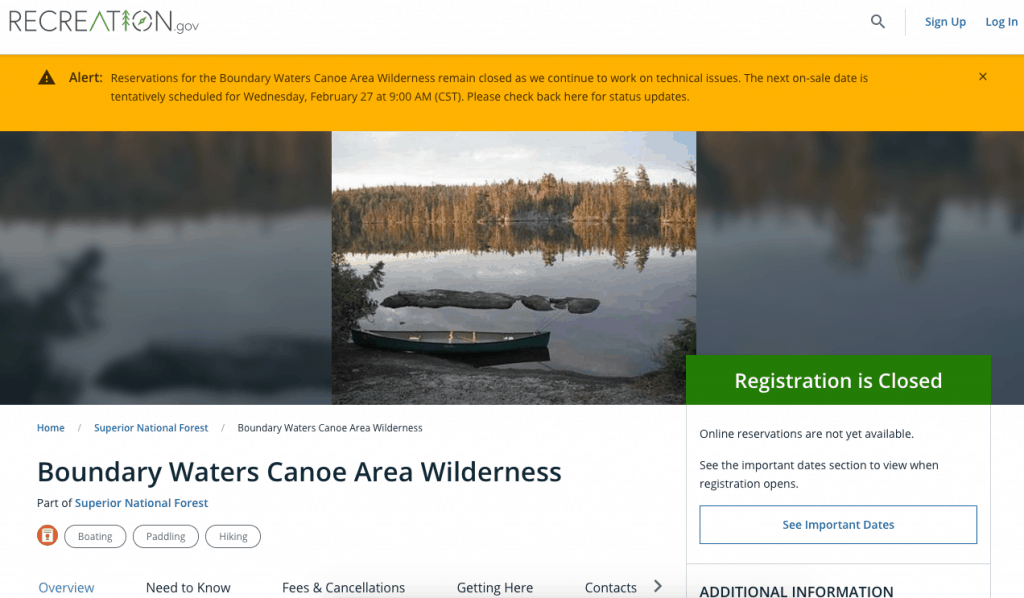
After the failure of a new online system to reserve Boundary Waters Canoe Area Wilderness permits on January 30, the Forest Service and its contractor, Booz Allen Hamilton, have been scrambling to fix the issue and get the system back online.
At the same time, officials have been facing intense criticism for how the system was developed, particularly in excluding from the process outfitters and other businesses that reserve and issue many permits for customers each year. Such cooperators say they weren’t consulted, received minimal training, and could not perform standard tasks on the system while it was briefly online.
Last week, the Superior National Forest announced a tentative date to re-open reservations: Wednesday, February 27 at 9 a.m.
Until then, there is no way to reserve a permit for the quota season that starts on May 1. The small number of reservations that were successfully made on January 30, in the approximately 75 minutes between the system opening and being taken down, were all cancelled and refunds were issued.
“We deeply regret the difficulty this has caused, and I want to thank the members of the community who are working with us to make this transition to an online reservation system successful,” said Superior National Forest Supervisor Connie Cummins. “Our goal is to ensure the reservation system provides a fair and open means for the public to visit the Boundary Waters and support the local businesses that depend on this special place.”
This month, the agency and contractor have had at least two meetings with a select group of cooperators to address questions, solicit input, and communicate plans to fix the system. Rep. Pete Stauber, the newly-elected Congressman who represents the district, also hosted a public forum in Ely.

Cooperator criticism
On Saturday, Feb. 9, Stauber’s event was attended by about 150 people. The freshman representative said he was concerned about the negative impacts of the system failure on local communities.
“The BWCA is a crown jewel not only in the state of Minnesota but this entire nation and internationally as well, so we have to get it right. We have outfitters in need in Minnesota. That’s their livelihood,” the Timberjay reported Stauber saying. “Many here feel like the Forest Service was not listening to them. I think the Forest Service representatives heard that loud and clear.”
The frustration about the system failure and the lack of cooperator involvement has been compounded by a new policy change this year. The Forest Service removed the lottery for high-demand motor day-use permits, making those permits available on a first-come, first-serve basis.
Such permits, for popular motorized lakes like Basswood and Fall, are a mainstay of some resort and outfitting businesses. Subjecting the businesses to the uncertainty of competing for the permits, rather than leaving it to the lottery, caused concerns even before the failure of the system launch. “We book a lot of permits for people and there was no public meeting of any kind,” Ginny Nelson, who operates Spirit of the Wilderness Outfitters in Ely, told the Star Tribune. “It was just a decision by the Forest Service that the lottery wasn’t needed.”
The first-come, first-serve system also is suspected to put residents of rural areas around the Boundary Waters, who don’t have high-speed internet, at a disadvantage.
Failure to communicate
The lack of engagement with cooperators is a common theme running through criticism that have been expressed in the past two weeks.
At least one outfitter who has been involved in discussions after the system failure says the lack of public input directly led to problems with the software beyond the technical issues. At a meeting with a small group of cooperators, the Forest Service, and Booz Allen shortly after the unsuccessful launch, the outfitters finally got their first look at the software they are supposed to use to reserve permits.
“Had the system actually allowed the general public to reserve permits at recreation.gov on go live, the Cooperator’s reservation system did not function as represented and would have actually prohibited or severely hindered Cooperators from reserving accurate permits,” Jason Zabokrtsky of Ely Outfitting Co. wrote to other outfitters.
Zabokrtsky also says the Forest Service had promised them the new system would be available for review and feedback last fall, but never followed through. He also pointed out that cooperators reserve more permits using the system than the Forest Service does.
Before the system can be re-launched, the Superior National Forest says it is working on fixing the technical problem in the software, training for cooperators, and testing. Once that is done, the agency will confirm the date and notify the public.
MORE INFORMATION:

